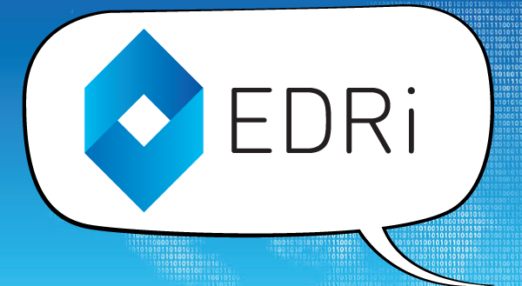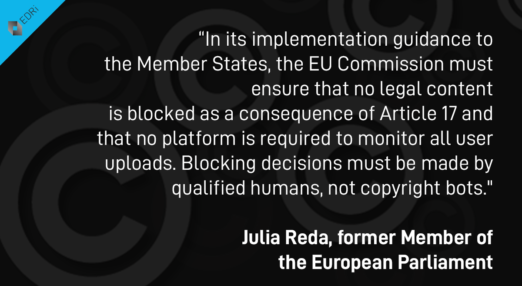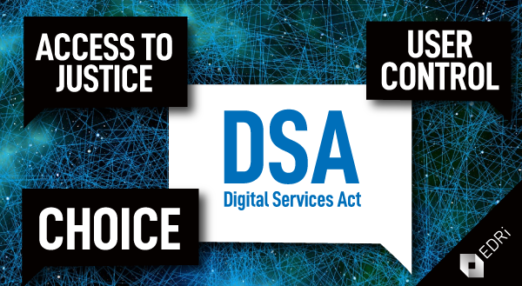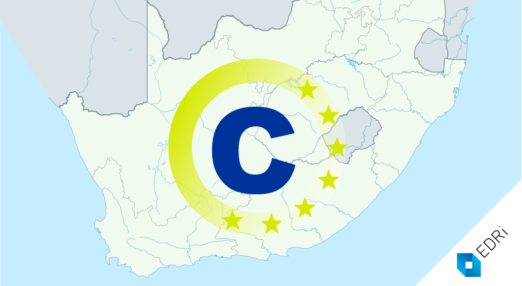Freedom of expression online
Filter resources
-

Terrorist Content Online: Is this the end?
On 10 December, the European Parliament and the German Presidency acting on behalf of the Council reached a provisional agreement on the Regulation addressing the dissemination of terrorist content online.
Read more
-

Statement: civil society challenges EU plans to expand biometric mass surveillance
On 9 December, the European Commission presented its new Security Union package, composed of the Counter-Terrorism Agenda and a proposal to strengthen the mandate of Europol. Originally intended for next year, the release of the Counter-Terrorism was accelerated due to recent attacks in France and Austria. When it comes to protecting fundamental rights from intrusive biometric surveillance, the proposals fall seriously short.
Read more
-

Walking from Luxembourg to Brussels in two hours
A public hearing before the European Court of Justice (ECJ) last Tuesday, November 10, dealt with the compatibility of Article 17, more precisely the provisions of Article 17 that require platforms to block copyright infringements, with the Charter of Fundamental Rights.
Read more
-

How the Parliament stakes out its DSA position
With three European Parliament positions on the Digital Services Act coming up, what will it mean for people's rights in the digital world?
Read more
-

Towards a digital Europe we want: the European Democracy Action Plan
On 14 September, EDRi submitted its response to the European Democracy Action Plan (EDAP) consultation. The EDAP, echoing the existing EU Action Plan on Human Rights and Democracy, focuses on preserving European democracies. The EDAP intends to address numerous challenges such as shrinking civic space, electoral interference, disinformation and the difficulties faced by journalists.
Read more
-

59% of polled EU citizens decry anti-terror upload filters. You should too.
Following disruptions due to the COVID-19 crisis, the negotiations between the European Parliament and the Council of Ministers on the Terrorist Content Regulation are resuming this week.
Read more
-

The new and improved EDRi-gram
The EDRi-gram that you know and love has received a facelift! Welcome to EDRi-gram 2.0. We know that change can be hard but we hope that you are as excited as we are to take the newsletter and EDRi’s efforts to the next level.
Read more
-

Upload filters? Still no, thanks
Together with thousands of protestors, EDRi has fought against mandatory upload filters in the Copyright Directive. Despite the Directive having been adopted, including the infamous Article 13 (now 17) that could lead to upload filters, the Directive allows for some flexibility to prevent the worst impacts on our freedom of expression.
Read more
-

Digital Services Act: what we learned about tackling the power of digital platforms
A year into EDRi’s policy and advocacy efforts to improve the DSA, we take stock of our efforts in mapping challenges and successes in enabling positive change.
Read more
-

First Analysis of the Austrian Anti-Hate Speech Law (NetDG/KoPlG)
On September 3rd the Austrian government released a legislative package to tackle online hate speech. Besides a comprehensive justice reform, the package also contains a bill that creates new obligations for online platforms to remove illegal user-generated content. This article offers a first analysis of the so called Kommunikationsplattformen-Gesetz (KoPl-G) and the many similarities it has to the German Netzwerkdurchsetzungsgesetz (NetzDG).
Read more
-

European Commission derails copyright reform in South Africa
Last year, the South African parliament adopted a progressive new copyright bill that would have drastically improved access to educational materials, introduced a fair use exception, implemented the Marrakesh treaty for the benefit of people who are blind or print disabled, and strengthened the negotiating positions of authors and performers in their negotiations with publishers.
Read more
-

The threat on OTF as a wake up call for European digital sovereignty
Around 2 billion people in 60 countries are able to use the internet securely and without risks of being surveilled or censored. And all of this, thanks to the work done by a non-profit called Open Tech Fund (OTF) for only 15 million dollars a year. However, all of this may be over soon.
Read more
